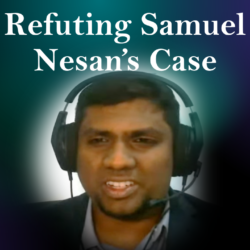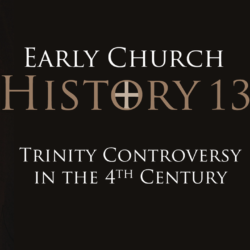Today we are starting a brand new class called “One God Over All!” My plan is to work through scripture to build a biblical theology of the one true God and his Son, Jesus the Messiah. This class will cover both texts supporting God’s exclusive oneness as well as misunderstood verses that seem to teach otherwise. Additionally, we will briefly explore how Christian theology developed from the New Testament period to the Trinity’s full articulation at the Council of Constantinople in a.d. 381.
This is part 1 of the One God Over All class.
Who is God? Let’s begin in the beginning with Genesis 1.1. We encounter the word elohim and ask ourselves, “What does this word mean?” and “Why is it plural?” Even more to the point, was this what ancient readers would have fixated upon? In this first class session you’ll learn all about the word elohim, what God’s name is, and how singular and plural pronouns tell us how many God is.
Listen to this episode on Spotify or Apple Podcasts
—— Links ——
- More one God resources and posts available here, including “Five Major Problems with the Trinity” and “The Trinity before Nicea“
- If you’d like to support Restitutio, you can donate here or designate Restitutio as your charity of choice for Amazon purchases
- Join our Restitutio Facebook Group and follow us on Twitter @RestitutioSF
- Leave a voice message via SpeakPipe with questions or comments
- Intro music: Good Vibes by MBB Attribution-ShareAlike 3.0 Unported (CC BY-SA 3.0) Free Download / Stream: Music promoted by Audio Library
- Who is Sean Finnegan? Read his bio here.







Sean
Enjoyed the message. Do you think it’s possible the “we” references by God would/could he the author conveying a sort of internal dialogue of God? Let us make… Let us go down… is not so much a “group” but a dialogue within himself to include his wisdom. Proverbs 8 is compelling to me. Specifically starting around verse 22 or so. Wisdom is personified as a person. Therefore the author is conveying with his wisdom he made man… etc. I’d appreciate any thoughts you have. Looking forward to the next session.
Jared, that sounds like the so-called “plural of majesty argument.” If so, I found this commentary helpful from the book “Covenant and Community: Our Role As the Image of God” by Doug P. Baker (2008, pp 18-20).
The idea that God could be using a plural of majesty has been put forward by some commentators. However, we are faced with the problem that God does not elsewhere refer to himself with such a plural.
Whether God is deliberating (“I will make him a helper” Gen. 2:18 NRSV) or considering his own majesty (“I the LORD your God am a jealous God” Exod. 20:5 NRSV), he always uses the singular of himself.
If God had used the plural of majesty to refer to himself at the creation, would he not have continued to do so? And linguistically it has been shown that “the plural of majesty is not used with verbs.” [Wenham, Genesis, p. 28.] That is, it is not left as an inference to be made by the hearer or reader. The plural of majesty must always be explicit, as a plural noun or pronoun.
In Genesis 1:26 the word “us” is not a separate word in the Hebrew, but is included in the verb. In order to function as a plural of majesty, plurality would need to be expressed by an actual noun or pronoun and not just left as an implied pronoun. This distinction is less clear to us in English, for nearly all of our pronouns are expressed, but the distinction is obvious in Hebrew. Because of this fact, few scholars still support the plural of majesty interpretation.
Also, the cohortative voice of the plural verb would tend to render difficult a singular understanding of the plural antecedent. In other words, the plural of majesty (in effect a singular) would not make sense of God’s call for unanimity in the endeavor. Such a meaning on God’s part would have required a singular cohortative voice (singular in the verb even if a plural of majesty were used for the noun/pronoun) rather than a plural cohortative. Even if it were here to be understood as a singular cohortative (difficult though that would be), we then would have the problem of understanding why God was trying to psyche himself up to some great feat. The singular cohortative works for humans, for we at times need to prepare ourselves before we undertake a work.
The understanding that the plural is God the Father speaking to the other members of the Trinity has fallen on disfavor in the past century and a half of textual criticism and scholarship. Long held as the standard orthodox view, “it is now universally admitted that this was not what the plural meant to the original author.” [Wenham, Genesis, p. 27.]
Carlos,
Thank you for the extensive reply. Certainly something to consider and will take me some time to digest the different grammar explanations. My intent was not to put forth a plural of majesty argument. I had to do some research to even know what that meant.
I do not consider myself a “scholar” so possibly this is simplifying it too much but if you start at Genesis 1 and begin reading… through the first 26 verses its all God doing the creating until we encounter the “Let Us”. If I don’t assume who the “us” is or try to read a doctrine back into the text.. just keep reading until it becomes more clear who the “us” may be. That’s where Proverbs 8:22-31 becomes an important consideration for me. Wisdom, personified as a person, speaks of being with God before and during his creation. Wisdom is at his side as a master craftsman.. master craftsman of what? The word used is architect. If I’m not mistaken this is the only place in the OT where that word is used. It then says Wisdom’s (God’s) delight was with the sons of men. To me that is one of the most compelling and clear explanations of the “us” in 1:26 and one of the safest to understand who/what was with God, when he alone created the earth and all that is in it. I am not dogmatic about it but to me that is the most clear explanation.
I understand there are other understandings such as divine council understanding, Trinitarians have their understanding, etc. One thing I do know is God’s wisdom was there at the beginning of his way (Pro 8:22). Before there was an earth and during the creation of it… “beside him as an architect”… that I can say for sure from Proverbs 8. This explanation may be too simple but its what I can verify via scripture. I believe that God alone is the creator and his wisdom was the architect of his creation.
Thanks again for sharing your thoughts.
Jared, I agree. God & His Wisdom (personified) makes the most sense. “Male & female, He created them”. When tracing Biblical Christology from the beginning, I see Genesis 1:1, interpreted in the original Hebrew as actually ending the debate before it ever actually begins. So I believe God establishes a “Unitarian” presupposition from the beginning. Genesis 1:26 is one of the most argued over passages in the Bible, but it’s easy to skip ahead to that verse & focus on “Us” to support whatever Christology one already holds to.
Enjoyed the podcast much. Great, clear explanations. If I may add to the great points you’ve already made about the grammatical plural Elohim not being evidence for the Trinity:
In Hebrew, the same grammatical plural with a singular meaning, the “plurality of majesty” occurs with the word “lord” adon, אדון (not God’s personal name יהוה). The grammatical plural is used with a singular meaning for other words, too.
There are many examples when the plural of adon (sir, lord, etc.) is used to refer to one person. Below are a few examples. A person won’t see this in English – the word will just be translated “lord” singular – but in each case the word “lord” in these verses is a grammatical plural:
1 Sam 25:14,1 Sam 25:17, 2 Sam 16:3, 2 Sam 20:6, 1 Kng 1:11, 1 Kng 11:23, 1 Kng 11:33, 1 Kng 12:27 ,1 Kng 16:24, 1 Kng 18:8,1 Kng 18:11, 1 Kng 18:14.
Seems to me people who don’t really know Hebrew make this “Elohim means plurality of persons” claim. But one reason the scholars like you quoted have moved away from such claims is because to make the word plural would not mean a plurality of persons, but a plurality of gods, i.e., clearly polytheism.
Blessings!
Bill, that’s similar to the word “one” (echad) where many think it means a “compound” or “complex unity.”
But as you know, the Hebrew language is perfectly able to communicate this so-called “plurality within the one God.” For example, they could have often for the plural echadim (Gen 11.1; Ezek 37.17)!
The fact is that the OT writers identify the “our God” of the Shema, YHWH, as the Father alone: Deut 32.8; Isa 64.8; Mal 1.6; 2.10, etc.
Hi Sean, greetings from the Netherlands. 🙂 A new series, this has got me excited! Some interesting points made in this episode. Here’s another take on the creation account, which generally seems to align with your interpretation. It’s from Rashi, who’s commentary I always find insightful to consider, and I think you will agree in this instance at least.
“Although [the angels] did not assist Him in His creation, and there is an opportunity for the heretics to rebel, to misconstrue the plural as a basis for their heresies, Scripture did not hesitate to teach proper conduct and the trait of humility, that a great person should consult with and receive permission from a smaller one. Had it been written: “I shall make man,” we would not have learned that He was speaking with His tribunal, but to Himself.
And the refutation to the heretics is written alongside it, in the following verse: “And G‑d created (וַיִּבְרָא),” and it does not say, “and they created (וַיִּבְרְאוּ).”
Jared, God’s wisdom is simply one of many other qualities of God that the OT writers tend to personify.
For example, in Job 10.12-13, 16 God’s “life,” “love,” “wisdom,” “power” and even His “care” are said to be “with” Him; in Isa 40.10; 62.11 “His reward is with Him”; and in 2K 3:12 “The word of the Lord is with him.”
Hence, back in Gen 1.26 you have one person, individual saying “Let us.” That obviously means God is addressing others and not Himself. The trini reading forces some kind of schizophrenia or multiple personality, aka Dissociative identity disorder on the part of God!
Here’s yet another trini scholar debunking his own beliefs, Dr. Michael Heiser from his book “The Unseen Realm”:
The solution is much more straightforward, one that an ancient Israelite would have readily discerned. What we have is a single person (God) addressing a group—the members of his divine council.
It’s like me going into a room of friends and saying, “Hey, let’s go get some pizza!” I’m the one speaking. A group is hearing what I say. Similarly, God comes to the divine council with an exciting announcement: “Let’s create humankind!”
But if God is speaking to his divine council here, does that suggest that humankind was created by more than one elohim? Was the creation of humankind a group project? Not at all. Back to my pizza illustration: If I am the one paying for the pizza—making the plan happen after announcing it—then I retain both the inspiration and the initiative for the entire project. That’s how Genesis 1:26 works.
Genesis 1:27 tells us clearly that only God himself does the creating. In the Hebrew, all the verbs of creation in the passage are singular in form: “So God created humankind in his image, in the likeness of God he created him.” The other members of the council do not participate in the creation of humankind. They watch, just as they did when God laid the foundations of the earth (Job 38:7).
Carlos,
I do see some evidence of scripture stating a sort of internal dialogue of the thoughts/heart of God. For example, Gen 8: 21the LORD said in his heart, “I will never again curse the ground because of man, for the intention of man’s heart is evil from his youth…” Here the author is revealing what God said in his heart. That is a sort of internal dialogue of the heart and thoughts of God.
I do get what you are stating about singular God, stating “Let us” but I don’t think of it as schizophrenic. That’s why I was asking Sean could this be understood as the author giving us a dialogue in the mind of God since it is plural in “let us” but then obviously he alone is the only creator in the very next verse. The dialogue with wisdom (the architect) who was with him from the beginning and personified as a person.
If God was in dialogue with his council as you stated and invited them to take part by saying “let us make” but then nobody took part doesn’t make sense to me. Being present with the creator of the universe and being invited to take part in creation but then just sitting back and watching as you suggested? Just evaluate what you wrote.
You state: Similarly, God comes to the divine council with an exciting announcement: “Let’s create humankind!”
You state: Genesis 1:27 tells us clearly that only God himself does the creating.
You state: The other members of the council do not participate in the creation of humankind. They watch..
God said “Let us Make Man” … “let us make” is an invitation to whoever he is speaking to join him in the process. No? You’re telling me they refused and just watched and didn’t want to take part after an invitation? OR the other alternative using your pizza analogy, God said “Hey let us go get some pizza” and then God doesn’t share any after inviting them to get some and makes his friends watch him eat it all. I dont think either of those are accurate. I think whoever God was speaking to would certainly take part in that invitation. The way to reconcile the US with the following verse that God alone did it would be if he was speaking with his architect (wisdom) which is part of himself.
Carlos,
Here is a passage to consider I think that is similar in function.
Daniel 2:36 Daniel is obviously the one telling the king the interpretation of his dream but notice how Daniel says “now we” will tell. Just before that Daniel is asking God for wisdom. Wisdom from God seems to be a theme in this passage and then Daniel says “we” when it seems he alone is interpreting the dream for the king. The Bible says the secret was revealed to Daniel.
19Then the secret was revealed to Daniel in a night vision. So Daniel blessed the God of heaven.
20Daniel answered and said: “Blessed be the name of God forever and ever, For wisdom and might are His.
21He gives wisdom to the wise And knowledge to those who have understanding.
23“I thank You and praise You, O God of my fathers; You have given me wisdom and might,
36“This is the dream. Now we will tell the interpretation of it before the king.
Curious who the “we” Daniel is referring to?
The “we” in Dan 2:36 is God and Daniel, as you noted from the context.
PS don’t forget Isaiah 6:8 the other “us” text where God is addressing His “divine council.”
Carlos,
Appreciate the dialogue. You are correct about Isaiah 6! No argument from me there.
Btw.. enjoyed your debate with Matt Slick.
Thanks for watching.
PS: next one is Friday, Oct. 15 at 8pm EST.
http://thehumanjesus.org/debate/
Hi Sean, thank you for this episode.
For people who spend time during sermons reading NIV notes at the bottom of the page, introductions to the creation of the book at hand, the maps in the back, and the preface in the front, I find that Bible scholars can provide surprisingly easy-to-read information that enable fair and reasonable understandings of the scripture.
Attention to these notes in the preface of my NIV Bible from the 80’s does indeed ward off confusion over the names of God in the Old Testament. It is comforting to keep reminding myself that the original text HAS BEEN CHANGED and to read with a discerning eye:
quote
The NIV Study Bible ( 1985 )
PREFACE p. xii
In regard to the divine name YWHW, commonly referred to as the Tetragrammaton, the translators adopted the device used in most English versions of rendering that name as “LORD” in capital letters to distinguish it from Adonai, another Hebrew word rendered “Lord,” for which small letters are used. Wherever the two names stand together in the Old Testament as a compound name of God, they are rendered “Sovereign LORD.”
Because for most readers today the phrases “the LORD of hosts” and “God of hosts” have little meaning, this version renders them “the LORD Almighty” and “God Almighty.” These renderings convey the sense of Hebrew, namely, “he who is sovereign over all the hosts” (powers) in heaven and on earth, especially over the ‘hosts’ (armies) of Israel.”
For readers unacquainted with Hebrew this does not make clear the distinction between Sabaoth (“hosts” or “Almighty”) and Shaddai (which also can be translated “Almighty”), but the latter occurs infrequently and is always footnoted. When Adonai and YHWH Sabaoth occur together, they are rendered “the Lord, the LORD Almighty”.
end quote
In our modern world of science we do not contemplate supernatural beings with regularity. Yet as in the ancient world of many gods and the modern world of many desired powers, the plurality of the word “Elohim” to describe my God YHWH simply emphasizes that he is sovereign over all/any other powers and influencers in existence whether he is addressing the divine council or science and its power. He is number one, the only true God the Father. PRAISE HIM and His word.